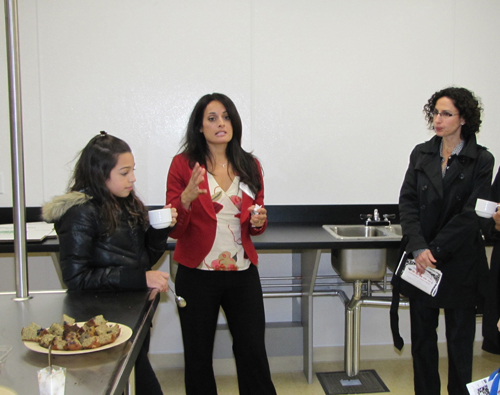Agricultural center swings open its doors at SBU incubator

Rebecca Castellano of Bellmore began making gluten-free foods her two children, who each have a disease that makes it dangerous to consume glutens.
Janet Jensen of Riverhead began making healthy cookies and snacks for herself, to keep her blood sugar stable.
And both soon discovered that a lot of other people liked the foods they were making.
Now, both of them are on the verge of starting businesses at the new Agricultural Consumer Science Center at Stony Brook University’s business incubator in Calverton.
The center was added onto the existing incubator, which opened in 2005 and has nearly 24,000 square feet of space for start-up businesses.
The agricultural center adds another 8,300 square feet at the Calverton site on Route 25.
The facility provides resources for agricultural producers and small scale food processors, along with dry, cold and freezer storing capacity, according to Stony Brook officials, who say 10 entities have been approved so far to use the new facility, including Ms. Castellano’s company, Rachel Lu Gluten Free Foods, and Ms. Jensen’s company, N.O.A. Bars (which stands for Nuts, Oats, Agave).
“It’s the beginning of a new chapter for agriculture on Long Island,” said Yacov Shamash, Stony Brook’s vice president of economic development and dean of the College of Engineering and Applied Sciences.
“Incubators help companies start up,” he said. “Half of all startup companies fail with the first five years. But historically, members of the National Business Incubator Association report, 87 percent of the firms that graduated from their incubators are still in business, and 84 percent of them remained in the same community.”
The Agricultural Consumer Science Center will provide regional wine and food producers access to shared processing areas, combined with the opportunity to collaborate with researchers, scientists and professionals from Stony Brook University, Brookhaven National Lab and the state Small Business Development Center, for guidance and advice, officials said.
Joe Gergela, executive director of the Long Island Farm Bureau, said the farm industry can use the help the incubator will provide.
“The industry is struggling because the cost of production on Long Island is greater than any place else in the country,” he said. While farmers’ costs keep going up, the return on their investment is not keeping pace, he said.
The center will consist of a shared-use, small-scale food processing operation that will allow farmers to add value to their agricultural products by sparing them the high cost of buying this type of equipment or manufacturing space, officials said.
Mr. Gergela said this project, combined with the J. Kings’ processing center on Sound Avenue, will be a big help to local farmers.
The center was funded by a $3.5 million state grant and work was completed less than a year after groundbreaking. Mr. Shamash said Senator Ken Lavalle (R-Port Jefferson) has been instrumental in developing the incubator, which is located on 50 acres of land donated to the state by Riverhead Town several years ago.
Ms. Castellano said two of her children, Rachel and Luke, have what’s know as celiac disease, an auto-immune disease caused by a reaction to gluten that can be deadly.
“About a year ago, my daughter came to me, frustrated with the foods I had been presenting to her that were on the market,” Ms. Castellano said. “I too was frustrated, as a nutritionist and mother of five. I questioned the quality of the ingredients on the market.”
She decided to create a product just for her children, but soon found that other people liked it too.
“Stores were actually calling me to carry the product,” she said.
She and her husband were actually considering purchasing commercial property to start a business when she stopped in the Riverhead Office Max on her way to make a delivery in Greenport.
The cashier at Office Max told her about the Calverton incubator. She then met with Monique Gablenz, the director of the incubator, and got an application in the next day.
But she realized that she needed a dedicated gluten-free kitchen, where only gluten-free items are made, and which the Calverton incubator didn’t have. She told Ms. Gablenz that she and her husband would have to decline the space. But Ms. Gablenz was able to get changes made in the project so there could be a dedicated gluten-free kitchen, Ms. Castellano said.
She said the couple now has accounts with several large companies, such as Wild by Nature, Whole Foods and Uncle Giuseppes, “that are just waiting for the cases to come.”
Ms. Jensen’s story is similar.
“For my own health purposes, and taste bud purposes, I decided to create a bar that I could eat with the base of almonds, oats and agave. I had a pan that made 28 bars, and you can only eat so many bars of one flavor, so I started passing them out to my friends and family, and they said, ‘Oh, you should sell these.”
She said she’d had food making experience in the past, but always reached a point where she couldn’t take it any further. Then a friend emailed her about a workshop at the incubator, which she said she had “passed by all the time, and have no idea what it was.”
“It was like Oz when you pass by those gates, because you can se the potential of what you can do here,” she said of the incubator.









